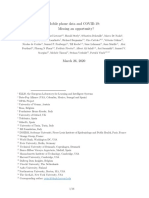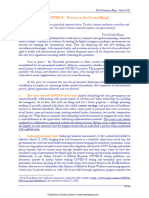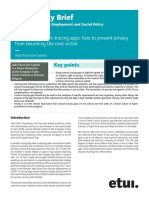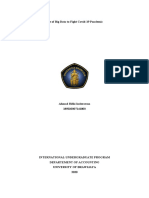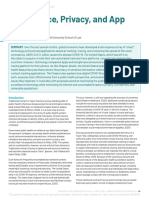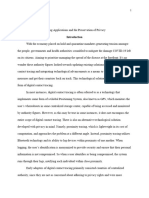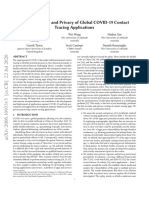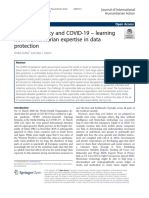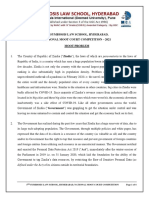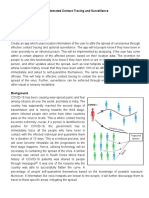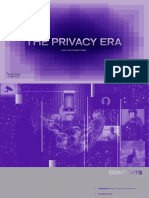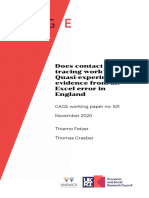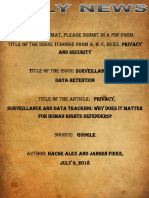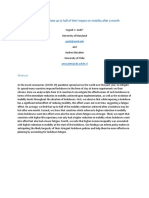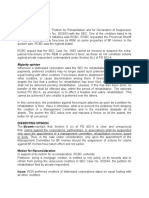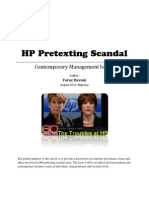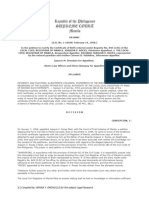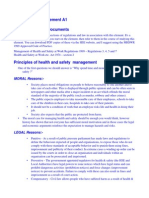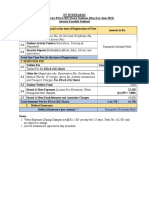How the US Government Tracks Your Movement
During COVID-19
Nathaniel Adams
The COVID-19 pandemic has mobilized countries in ways our world has not seen since
World War II. Through rapid policy implementation, countries are attempting different ways to
curb the virus from spreading faster than the available healthcare infrastructure can handle.
One such way is tracking how people move around using cellular data.
How it’s implemented
Local and state governments have deployed COVID-tracking apps throughout the
United States. Nearly all have failed to convince residents to allow the tracking of their
movements. It makes sense considering 84% of Americans are worried that data collection for
COVID-19 containment will sacrifice too much of their privacy. Knowing this, local and state
governments have moved onto a different strategy. Instead of asking citizens to participate,
agencies across the country are turning to location-data companies.
Most of us use apps that passively collect timestamped geolocations. Consider the
places you’ve traveled to using a maps service, the photos you’ve tagged on social media
platforms, or other location-based apps you might have used recently. This data, called
mobility data, is aggregated and sold to location-data companies due to its value in the
advertising industry. Companies that serve this type of data, such as Foursquare Labs, Inc.,
have engaged with local governments to deploy this data in the fight against COVID-19. Unlike
other sources of data, location data is highly unregulated, and local policymakers have not
revealed how this data is being used.
Unintended Consequences
With the rapid deployment of these tracking tools come many unintended
consequences. One consequence is how this data under-represents specific groups of people.
Rural communities and lower-income citizens have lower rates of smartphone usage, shifting
the deployment of resources based on mobility data out of their favor. Additionally, there exist
implicit biases of policymakers who have unregulated access towards collecting and
interpreting the results of this mobility data. Biases that might influence them to prioritize some
communities over others.
The lack of policy regulations doesn’t just affect underrepresented groups. It affects all
citizens through violations of privacy. While very few government agencies have outlined how
they handle the collection of mobility data, the Centers for Disease Control and Prevention
outlined that they anonymize location data of names, addresses, phone numbers, and other
identifiable information. However, by mapping mobility data onto addresses, identities are
easily obtained from these datasets. It is illegal for telecommunication companies to offer this
data directly, so it has only been obtained from largely-unregulated secondary data brokers.
The United States has yet to implement regulations that prevent the misuse of mobility
data, and it has dark implications on our civil liberties. Historically, the United States has used
�data collected on its citizens in unforeseeable ways. From surveilling protestors to detaining
Americans deemed a threat, datasets collected for benevolent purposes have often been
misused by local and federal governments. The lack of regulation on how COVID-19 mobility
data can be used poses a grave threat to the human rights of all Americans.
Stakeholders
Data collection in response to a pandemic is vital to understanding how to respond to
outbreaks and protect our citizens. In addition to the costs to human rights, collecting and
deploying COVID-19 tracking has its own budgetary costs for departments across the United
States. While the use of mobility data for contact tracing has failed in the United States, it is yet
to be seen if its success in timing stay-at-home measures and deployment of public health
resources outweigh the potential costs.
Public health departments from the local to the federal levels of U.S. government have
a vested interest in seeing the success of COVID-19 responses. Their ability to handle the virus
in the respective jurisdictions will determine both their perception by the public as well as
funding to their departments. Their power has expanded drastically in the past few months in
response to the pandemic. H.R.6074 alone, passed in March, offered $8.3 billion in emergency
funding for federal agencies to respond to the coronavirus outbreak. Of this amount, $730
million has been deployed by the CDC to state, local, territorial, and tribal jurisdictions. This
has greatly inflated the capacities of local and state governments.
These departments, in partnership with their encompassing governments, have
enforced policies in response to COVID-19. Many of these partnerships serve conflicting
interests. While governing bodies of cities and states may use mobility data to enable
COVID-19 responsiveness, regions experiencing protests would benefit from using this data to
identify dissidents and curb civil unrest. Understanding this data would also enable creative
politicians to distribute ballot boxes in a way that disproportionately affects who can vote, a
tactic many politicians have opted for during this election.
Who Did it Right
Despite the urgency of the pandemic, thoughtful legislators could have averted these
risks. Consider Taiwan, where mobility data was collected only in the case of positive tests of
COVID-19, and transparency of the process was essential to each decision. Singapore
emphasized privacy even further by creating an app that did away with geolocation data
entirely. Singapore’s contact tracking platform stores the proximity to other citizens around you
using bluetooth locally on your device. It is deleted after a short period of time or upon your
request.
The Power of Place
While the collection of data may be successful, the policy’s effectiveness is determined
by how well other government agencies act on the information gleaned from it. A government
that serves its citizens will swiftly use the data to learn how we behave in response to a
pandemic then delete it to protect its citizens. A malevolent government might find alternative
ways to use this information to expand its own power at the expense of its citizens. While most
would consider the US response to COVID-19 a failure, it is in the hands of policymakers to
begin regulating how mobility data is used by governments.



